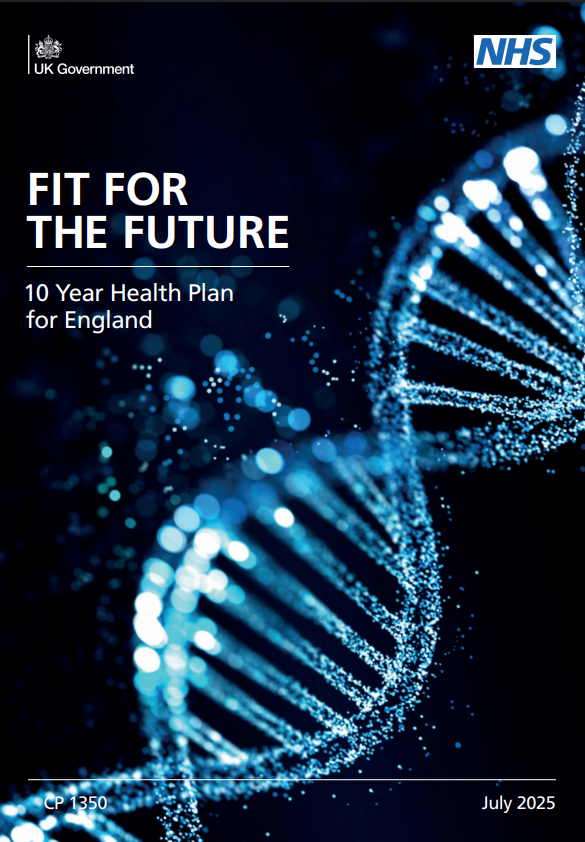
By Marta Buczkowska, Registered Dietitian, MyNutriWeb
The newly unveiled NHS Plan has landed, bringing with it a renewed focus on disease prevention and a significant shift towards digital and community-based care. Just ahead of its publication, we consulted AI and meticulously analysed its predictions – and while some certainly found their way into the final document, there are crucial areas begging for further development. In this blog, we dissect what’s truly next for the NHS, exploring the move from reactive treatment to proactive prevention, and considering where we, as a nation, go from here.
What’s next for the NHS? Moving from treatment to prevention – and where we go from here
The newly unveiled NHS Plan brings with it an increased focus on disease prevention and improving access to healthcare through shifting from analogue to digital and from hospital-based care to community centres. These changes reflect a growing recognition that reactive, hospital-centred treatment alone is no longer sustainable, we must address the root causes of ill health and make healthcare widely available to all.
While we welcome several positive steps outlined in the Plan, there remain key gaps that must be urgently addressed to create a truly equitable, sustainable and healthy society.

What’s continuing: positive momentum in policy
We’re encouraged by the government’s commitment to go ahead with restricting unhealthy food advertising to children. This move acknowledges the powerful role of familiarity in shaping dietary preferences from a young age. It’s one step in the right direction, but we urge policymakers to go further extending advertising bans not only to public transport, like it’s already done in several areas of England which would further amplify the benefits, but to a blanket ban on advertising all HFSS foods like Norway.
Similarly, updating the sugar tax to reflect inflation and extending it to all HFSS foods is a practical, evidence-based move that can further drive the decline in HFSS foods and beverages consumption.
What’s new – and what’s working
We welcome the broader recognition of the role of diet in preventing non-communicable diseases such as obesity, cardiovascular disease and type 2 diabetes. Nutrition and lifestyle interventions must be at the centre of our prevention strategy, not an afterthought.
We applaud the introduction of mandatory healthy food sales reporting across major food businesses. Supermarkets account for 95% of grocery sales and more than 80% of calories consumed in the UK. It’s time we ensured those calories come from healthy nutritious foods. This data should be used not only for transparency but also to set bold national targets for healthier food sales as recommended by the Eating Better Alliance. We hope to see the reported data used in developing ambitious targets and policies for healthy food sales, and we will closely monitor the next steps following the standard’s implementation.
Another promising development is the proposal for an incentives-based system to encourage healthy eating and physical activity. While gift vouchers and other incentives can be an effective tool in shaping food choices, we hope to see this initiative accompanied by systemic changes to the food environment. These should include improving the availability and affordability of whole, plant-rich foods, and modifying the default food options in public and commercial settings.
We are also encouraged by plans to expand access to weight-loss medications through the NHS, particularly when their use is linked to measurable health outcomes. However, to create lasting change, we believe this must be accompanied by strong policies that prioritise whole, plant-rich diets and transform the wider food environment.
The Plan’s inclusion of new alcohol labelling standards and the emphasis on the no- and low-alcohol markets is another step forward. Yet, we believe stronger measures are needed. Restricting alcohol advertising and controlling sale hours could more effectively reduce harmful consumption and protect public health.
The introduction of neighbourhood health centres offers an exciting opportunity to decentralise care and bring support closer to communities. We hope to see registered dietitians and nutrition professionals and credible evidence-based programmes embedded within these centres to lead lifestyle-based disease prevention strategies.
What’s missing – and where we need to push further
Despite overwhelming scientific consensus on the benefits of plant-rich diets – for health, the environment, and the economy – a meaningful strategy aimed to promote healthy sustainable diets did not find a place in the new NHS Plan. Research shows that shifting towards the EAT-Lancet Planetary Diet can significantly reduce mortality, obesity, heart disease, and diabetes, making it a cost-effective preventative tool. Beyond improved health outcomes, adopting whole food, plant-rich dietary patterns could also ease the burden on healthcare workers by reducing the prevalence and severity of diet-related chronic conditions. Public institutions leading the way with plant-forward menus could also bring enormous financial savings to the NHS – up to £55 million annually. We urge policymakers to recognise the potential of healthy sustainable plant-rich diets and embed them as a central pillar in future public health strategies.
Another major omission is the lack of regulation in the baby and toddler food sector. Many commercial products in this space fail to meet basic nutritional standards, despite being marketed to the UK’s most vulnerable consumers. Stronger standards and transparency are urgently needed to protect child health.
Finally, true prevention must include support for food access and mental health. Many communities still live in food deserts with limited access to nutritious meals, and socio-economic inequality remains a major barrier to health equity. Digitalisation, genomics or AI utilisation will not bring meaningful changes to communities without access to basic rights – including healthy food, clean air or healthcare access, and these must be addressed if the NHS is serious about preventing disease and building a healthier nation.
Where MyNutriWeb is helping
At MyNutriWeb, we are proud to stand behind the growing momentum toward prevention-first healthcare. As a leading provider of evidence-based, educational resources, and initiatives, we empower dietitians, nutrition professionals, public health professionals, and healthcare providers to:
- Deepen their understanding of food choice determinants and behaviour change techniques
- Stay up to date with cutting-edge nutrition science and policy developments
- Apply the latest tools and initiatives to promote sustainable, plant-rich dietary patterns
- Advocate for healthier food environments in clinical, public health, and institutional settings
If you would like to collaborate on a roadmap for better food nutrition and health through healthcare and food service get in touch – we would love to chat: hello@mynutriweb.com
Final thoughts
If we are serious about preventing disease, we must transform our food systems, reshape our environments, and empower professionals on the frontlines of public health. The NHS Plan is one step forward – but only a bold, united push forward will change the future of health in the UK.







This is a powerful end message. As someone who took plan in the NHS long term plan webinar giving my opinion, I am sad –
“Despite overwhelming scientific consensus on the benefits of plant-rich diets — for health, the environment, and the economy — a meaningful strategy aimed to promote healthy sustainable diets did not find a place in the new NHS Plan”.
This did not make it to the top of the list for change. How can the nation be healthy if the basic standard of living healthy is omitted, but as politics continues to take the top lead, many will continue to lack the basic knowledge in the society. From my opinion, until we as individuals take the stand for ourselves in protecting our health, the government has shown how much we need to take responsibility for our own health.
Dear Marta,
Thank you, great piece, shame to see that preconception health is not included, a time when we have the greatest opportunity to optimise future health
The NHS’s renewed focus on public health prevention is a logical, necessary, and welcome step towards creating a more sustainable and effective health service that truly prioritises the well-being of the population. Its success will hinge on sustained political will, adequate funding, genuine cross-sector collaboration, and effective implementation strategies. Moving towards prevention often involves empowering individuals with the information, resources, and support they need to take more control over their health. This can include promoting healthy lifestyles, early detection and screening, and better management of existing conditions to prevent progression. This is welcome news for Public Health Practitioners and advocates of a healthy lifestyle.